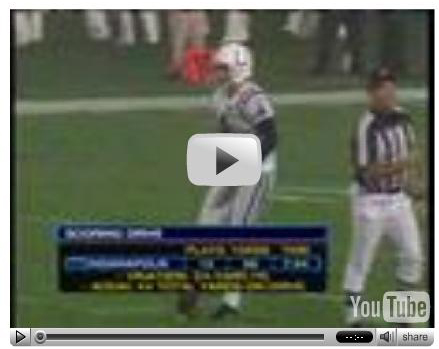Google YouTube 'victims' championed by Chilling Effects, EFF, Harvard Law School

The Super Bowl put forth a super opportunity for Wendy Seltzer, Fellow, Berkman Center for Internet & Society at Harvard Law School.
Seltzer acknowledged at her blog:
I snipped the copyright warning out of the weekend's Super Bowl broadcast as an example for my copyright class of how far copyright claimants exaggerate their rights. This telecast is copyrighted by the NFL for the private use of our audience. Any other use of this telecast or of any pictures, descriptions, or accounts of the game without the NFL's consent, is prohibited. Let's see whether the video, clear fair use, gets flagged by a copyright bot.
Despite Seltzer’s super confidence, her taping and public re-broadcasting of the National Football League’s copyright material is not a “clear fair use,” as her copy of NFL property, as shown below, “clearly” suggests.

In “YouTube: Is Viacom hurting innocent YouTubers?” I discuss Seltzer’s founding of “Chilling Effects” at the Harvard Center for Internet & Society, in collaboration with the Electronic Frontier Foundation (EFF):
Founded at the Berkman Center by Fellow Wendy Seltzer, Chilling Effects is a joint project of the Electronic Frontier Foundation and law school clinics at Harvard, Stanford, Berkeley, the University of San Francisco, and the University of Maine.
In “Google YouTube: Is Viacom the big bad wolf?” yesterday, I analyzed the EFF advocacy efforts underway at YouTube to solicit YouTubers deemed to be “caught in the Viacom takedown,” noting an ominous voice suggests Viacom may be as dangerous as a big bad wolf.
In “YouTube: Is Viacom hurting innocent YouTubers?” I point out Chilling Effect collaborator Stanford Center for Internet and Society receives funding from YouTube corporate parent Google, as I reported and analyzed in “Google’s $2 million Stanford ‘fair use’ underwriting” last November.
The Google YouTube—Chilling Effects—Harvard Center for Internet & Society—Stanford Center for Internet and Society—Electronic Frontier Foundation web is a high powered one with an apparent shared desire to make sure Google is undeterred in its mission to organize all the “world’s information,” regardless of what the world’s content owners have to say in the matter.
I have been chronicling and analyzing the Jim Moore, former Senior Fellow at the Harvard Center, efforts to mobilize YouTubers he believes were “victimized” by Viacom’s copyright infringement claims against Google’s YouTube.
In a layman’s nut shell, mega corporation Google is deemed to be a “free content” friend deserving of support, while mega corporation Viacom is viewed as a “paid content” enemy deserving of vilification.
Moore at his blog hosted at the Harvard Center:
Google has enabled astonishingly easy and comprehensive access to the riches of the digital landscape. Google has found a way to fund their service from advertising.
Viacom and other traditional media companies have a different model. Their model is to find exceptional talent, develop that talent to the highest level, and then make the expressions of talent available for a hefty fee.
Is Viacom really the big bad wolf as Google YouTube—Chilling Effects—Harvard Center for Internet & Society—Electronic Frontier Foundation strive to warn?
As I underscore in “Google YouTube: Is Viacom the big bad wolf?”, it is Google that has chosen to operate under a business model which apparently hurts all rights holders, corporate mainstream media conglomerates and “friends and family” video creators.
Google also has chosen to do all in its power to make sure its DMCA fueled no need to pay for content business model flourishes:
The Stanford Center for Internet and Society's "Fair Use Project" ("the FUP") was founded in 2006 with a substantial donation from Google, Inc.
Its purpose is to provide legal support to a range of projects designed to clarify, and extend, the boundaries of "fair use" in order to enhance creative freedom.With the cost of defense minimized, more content creators will stand up for their fair use rights. More fair use cases will be adjudicated, providing more clarity in the law and a more robust fair use doctrine. As the Fair Use Project develops, and the network of attorneys expands, the FUP hopes to bring these effects to bear on an ever-increasing scale.
Ultimately, we seek to not only define and expand the law, but change the way content owners approach fair use issues.
In other "fair use" Google words, “a “focus on the legal aspects,” is not the way to approach a relationship with number one search engine Google.
Is Google Headed for a Fall?
READ THE GREAT GOOGLE DEBATE in FAST COMPANY MAGAZINE:
Donna Bogatin vs. Danny Sullivan!